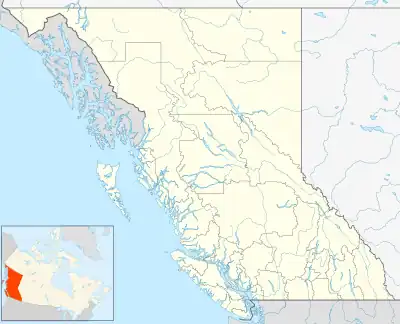Sewall, British Columbia
Sewall, sometimes incorrectly spelled Sewell, is an unincorporated locality located on the north shore of Masset Inlet, on Graham Island in the Haida Gwaii archipelago (formerly known as Queen Charlotte Islands) off the North Coast of British Columbia, Canada.[1] It is located 21 miles up Masset Inlet.[2]
Sewall | |
|---|---|
 Sewall Location of Sewall in British Columbia | |
| Coordinates: 53°45′55″N 132°18′00″W | |
| Country | |
| Province | |
History
Sewall began its life as a real estate promotion dubbed Star City, after the developer, the Star Realty Company, during a real estate boom on Graham Island that also saw the foundations of Juskatla, Delkatla and Graham Centre,[3][4] but the name Sewall was finally chosen, being that of S.D. Sewall (the "Sewell" spelling is featured in the provincial gazette of 1930, but was a mistaken association with Sewell Inlet nearby, which has a different name-origin.) By the end of 1913, seventy families had settled here, mostly Icelandic Canadians encouraged to relocate from Manitoba. After the First World War, most families moved away, but one of the original homesteaders, Paul Bastian, bought up most of the land and continued to live on and raise his family there.[5][6] S.D. Sewall said that he was interested in farmland in the area surrounding Sewall, and that it was not the intention of the developers "to force the new town's growth but to build up the area around it".[7]
Sewall had been the site of a sawmill owned by the Masset Inlet Lumber Company.[8]
Climate
| Climate data for Sewall | |||||||||||||
|---|---|---|---|---|---|---|---|---|---|---|---|---|---|
| Month | Jan | Feb | Mar | Apr | May | Jun | Jul | Aug | Sep | Oct | Nov | Dec | Year |
| Record high °C (°F) | 11.7 (53.1) |
14 (57) |
15.6 (60.1) |
23.6 (74.5) |
26.5 (79.7) |
28.5 (83.3) |
30 (86) |
32.2 (90.0) |
27.8 (82.0) |
18 (64) |
14.5 (58.1) |
11.5 (52.7) |
32.2 (90.0) |
| Average high °C (°F) | 5.4 (41.7) |
6.2 (43.2) |
7.9 (46.2) |
10.4 (50.7) |
13 (55) |
16.2 (61.2) |
18.2 (64.8) |
19 (66) |
16.5 (61.7) |
12 (54) |
7.8 (46.0) |
5.4 (41.7) |
11.5 (52.7) |
| Average low °C (°F) | 0.8 (33.4) |
0.7 (33.3) |
1.3 (34.3) |
2.6 (36.7) |
5.1 (41.2) |
8.2 (46.8) |
10.6 (51.1) |
10.9 (51.6) |
8.8 (47.8) |
5.7 (42.3) |
2.1 (35.8) |
0.9 (33.6) |
4.8 (40.6) |
| Record low °C (°F) | −12.2 (10.0) |
−14 (7) |
−10.6 (12.9) |
−3 (27) |
−1.1 (30.0) |
1 (34) |
4.5 (40.1) |
4.5 (40.1) |
1 (34) |
−7 (19) |
−17 (1) |
−13.3 (8.1) |
−17 (1) |
| Average precipitation mm (inches) | 157.3 (6.19) |
127.3 (5.01) |
110.8 (4.36) |
98.9 (3.89) |
83.8 (3.30) |
69.6 (2.74) |
61.4 (2.42) |
79.2 (3.12) |
119.1 (4.69) |
224.5 (8.84) |
203.8 (8.02) |
172.9 (6.81) |
1,508.4 (59.39) |
| Source: Environment Canada[9] | |||||||||||||
See also
- List of communities in British Columbia
- Sewall (disambiguation)
References
- "Sewall". BC Geographical Names.
- New Town Born Up Masset Inlet, Masset Leader, 19 September 1912
- Started with the Sewall mill: Cheapens the Cost, Masset Leader, 6 February 1913
- Masset Leader editorial, 2 January 2013
- The Queen Charlotte Island, Kathleen Dalzell, Evergreen Press, Chapter 39: The Story of Sewall]
- Queen Charlotte Islands – Book 2: of places and names, Cove Press, Prince Rupert, 1973
- New Town Born Up Masset Inlet, Masset Leader, 19 September 1912
- Started with the Sewall mill: Cheapens the Cost, Masset Leader, 6 February 1913
- Environment Canada—Canadian Climate Normals 1971–2000, accessed 28 March 2010